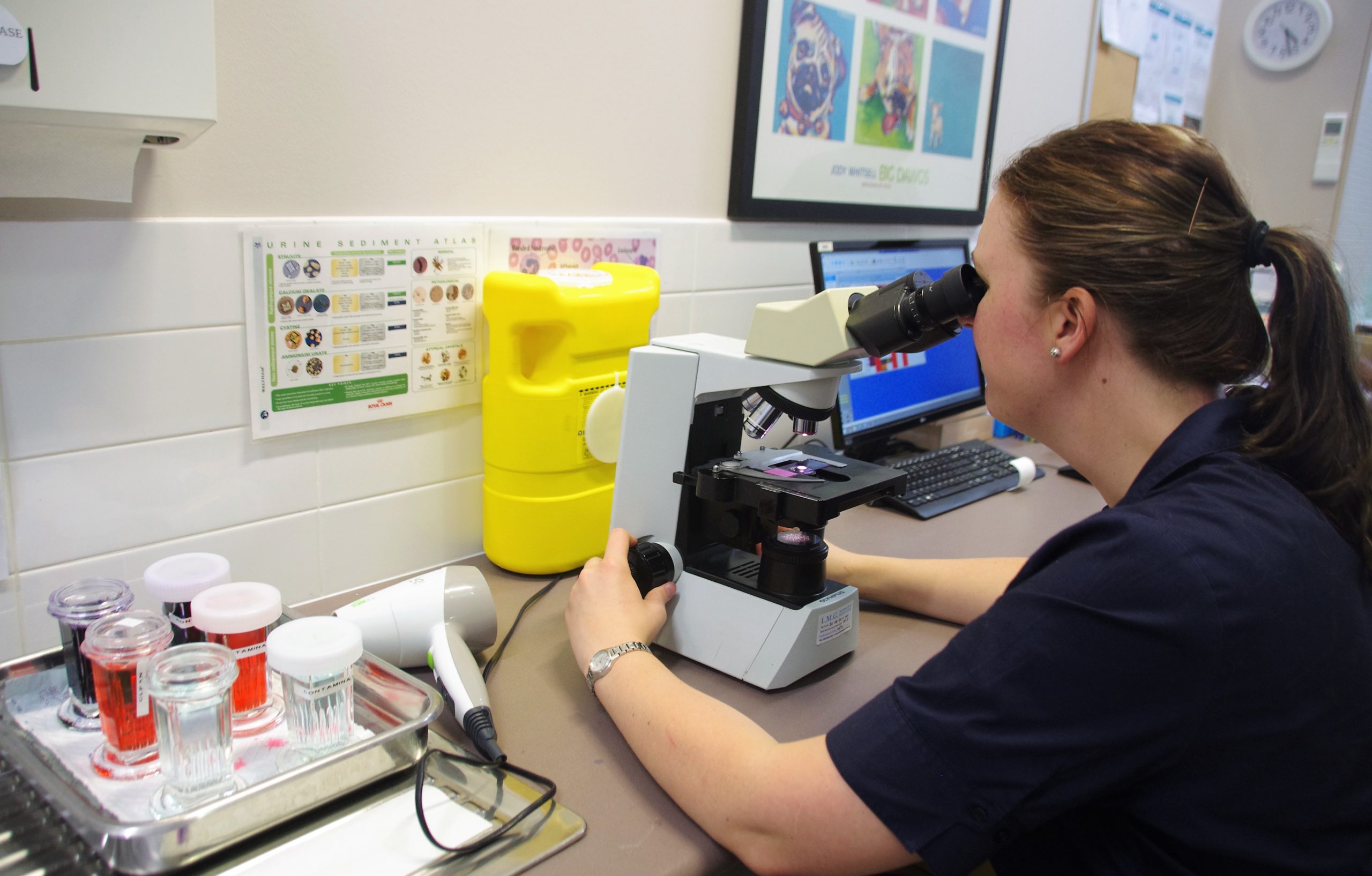Busselton Vet Hospital
Diagnostics and Testing
Your pet’s health is our team’s top priority, so we take great care in diagnostics, testing, and prevention.

Diagnostics and Testing
at Busselton Vet Hospital
Our veterinarians and veterinary staff use state-of-the-art diagnostic equipment to ensure your pet’s condition is accurately and confidently measured.
Pet Blood Testing and In-house Laboratory
The main reasons why we run blood tests are sickness, wellness screens, pre-anaesthetic screens, geriatric screens and to monitor chronic conditions.
Our in-house laboratory facilities allow us to run tests for: hematology, biochemistry, electrolytes, hormonal assays, urinalysis, and parasites. We also utilise commercial veterinary laboratories for specialised diagnostics and consultations.
Click here to read more.
Pet Radiology Services
Pet Electrocardiography Services
An ECG is the only way to define an arrhythmia of the heart. Follow-up ECGs allow us to monitor the heart’s response to therapy and confirm that medication levels are appropriate.
Pet Ultrasound
As part of our desire and commitment to offering our patients the highest level of veterinary care, Busselton Vet obtained a high-level ultrasound machine at the start of 2021. We are now pleased to offer ultrasonography as part of the medical and emergency treatment of your pets.
Click here to learn more.
Services

about our lab
Blood testing and Laboratory
Our hospital has a dedicated laboratory area where we perform blood testing and work up samples.
Why we run blood tests
Sickness: in order to assist in the diagnosis of disease and help us provide the best treatment to our patients.
Pre-anaesthetic screens: these are run before any animal has a general anesthetic or sedation to ensure the procedure is as safe as possible.
Geriatric screens: blood screens for our older patients enable us to diagnose diseases at the earlier stages. While a condition may have not started showing signs that you or we can see yet, it may be well on its way into affecting your pet’s life. Identifying such changes early, means there may still be time for therapy which may earn your friend a few more happy months or even years depending on the condition.
Chronic conditions: monitoring blood work for existing conditions in order to assess the effectiveness of the treatment as well as identify any progression in the disease or any possible side-effects from the medication. Animals with diabetes, cushings, thyroid problems are examples of who would have regular blood tests as well as any animal on long-term anti-inflammatories.
IDEXX technology blood tests
We use IDEXX technology (Idexx) and are able to perform most routine blood testing including:
Complete Blood Counts (CBC): quantifies red blood cells, white blood cells and platelets as well as other blood cell parameters.
Biochemistry: glucose, protein, renal markers such as urea and creatinine, liver markers, electrolytes etc.
Urinalysis: using dipsticks to test urine samples for blood, protein, glucose etc which may indicate inflammation and/or infection
As well as more specific tests such as:
Cortisol levels – for diagnostic and monitoring of Cushing’s and Addison’s diseases.
Total T4 – one thyroid hormone level test for hypo-and hyper-thyroidism.
Canine pancreatic lipase test (cPL) – to aid the diagnosis of canine pancreatitis.
Pro-thrombin time (PT): to evaluate the blood clotting ability of a patient and most commonly used for rodenticide toxicity (rat sack),snake bites as well as other coagulation disorders.
Screening tests for Feline Immunodeficiency Virus(FIV), Feline Leukaemia Virus (FeLV), canine Heartworm disease, canine Parvovirus, canine Corona virus.
We also have a microscope which we use to examine blood smears for any changes to the cells, any toxins and any blood parasites (ie. heartworm)
Our microscope is also used for:
Ear swabs, skin scrapes or impression smears: bacteria/fungi/mites.
Nose, eye, genital and any other discharge: bacteria/fungi/inflammatory cells.
Urine sediments and cytology: blood cells, bacteria, crystals.
Faecal analysis: bacteria, parasites, worm eggs, inflammatory cells.
Fine needle aspirates to assist the diagnosis of the cells present in any mass or lump.

